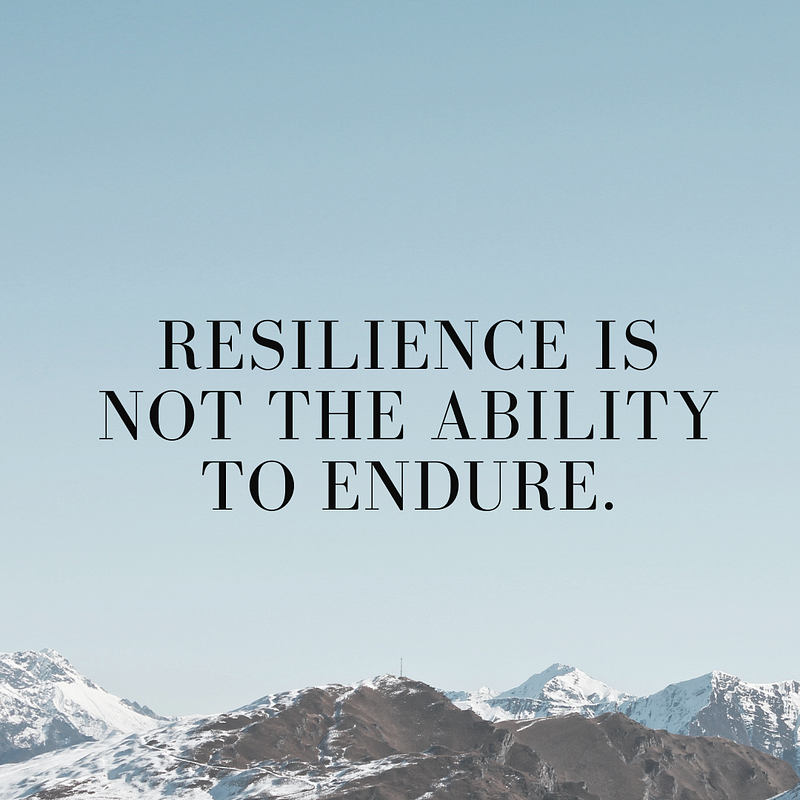Can you build resilience?
Resilience is not the ability to endure

Many years ago, in fact it seems like a lifetime ago, I worked as an experiential learning instructor…what's one of those I hear nobody ask? In its most basic sense, I took young people who were having difficulties up rock faces(climbing), down rivers(canoeing), over mountains(walking or biking) and under ground(caving). I worked for a specialist team for a local authority (this was back in the days when there was money for anything beyond the bare minimum). The young people I worked with were a whole range; those in foster care, those from abusive families, neglected, unloved, abandoned. There were a few aims of the work, respite, physical wellbeing, fun(!)……but one I vividly remember from the monitoring was “to build resilience”.
So I would take young people to the outdoors, and into exciting and challenging situations. Hundreds of feet up a crag, sometimes wet and tired on a hillside, somewhere in the darkest of caves, building resilience. I was good at my job, I connected with the young people, everything was always safe, but I always pushed past their comfort zone. I was helping them build resilience. But looking back, I don’t think I fully understood resilience at all.
Many years later, I took up running. I enjoyed it, so I ran further. Half marathons turned to marathons, which turned to ultra marathons. I wanted to be out of my comfort zone, I wanted to find my limits. And I did. And it was then that I started to think more about what resilience actually means. There are so many factors that go into finishing an ultra marathon beyond some physical fitness. Running is often the easy bit. Digesting the thousands of calories you need while your stomach is screaming no isn’t. Your feet swell and blister, your bag rubs a hole in your lower back, sunburn, hypothermia, dehydration, getting lost…..just some of the things that have happened to me.
And this is when it started to dawn on me, that all those years ago, I’d confused resilience with the ability to endure, and that the distinction between them is so so important.
Enduring takes a toll
Maybe I could learn how to cope with blistered feet for 60 miles, but wasn’t it better to prevent getting blistered feet in the first place? What if I learned how to look after my feet, spot the signs, carry spare socks, wear bigger shoes….surely that’s better than becoming better at enduring, at blocking out the pain? Enduring takes a toll. There are only so many times you can pick yourself up.
And I think that it wasn’t just me confusing what resilience actually means. I see it still. “Resilient workers are mentally strong” is one quote I see associated with resilience in the workplace. There are several things wrong with this, but here are my main reasons it is wrong, and in many ways dangerous. This thinking puts the onus onto workers to be strong, to cope with the workplace. It is not the workplaces fault, it is the workers fault. It also implies a static state, whereas I think resilience is dynamic.
Resilience is about action not enduring.
Now, I don’t think this is revolutionary thinking, I’m hopeful that many people know and understand this on a personal level. But what about on an organisational level, or a system level? If we think about resilience as active, as responsive, we can perhaps think about how we all have an impact on resilience. Action is only possible if people and organisations are empowered to act, if they can see how to act and if they think that an action might achieve something.
And this brings me to my work currently. If we want to build resilience in charities, we can’t expect this to only be on them. We have to empower them to act, which means them having the means to act AND having a sense that their action might achieve something. So in my current work I’m looking at the interplay between internal and external factors that affect resilience. There are obviously things that charities can do, to prepare, adapt, flex, but there are also things that must change at a system level if we ever want actual resilience.
So yes, I think you can build resilience, let’s just make sure it is about empowerment and action, not about enduring.